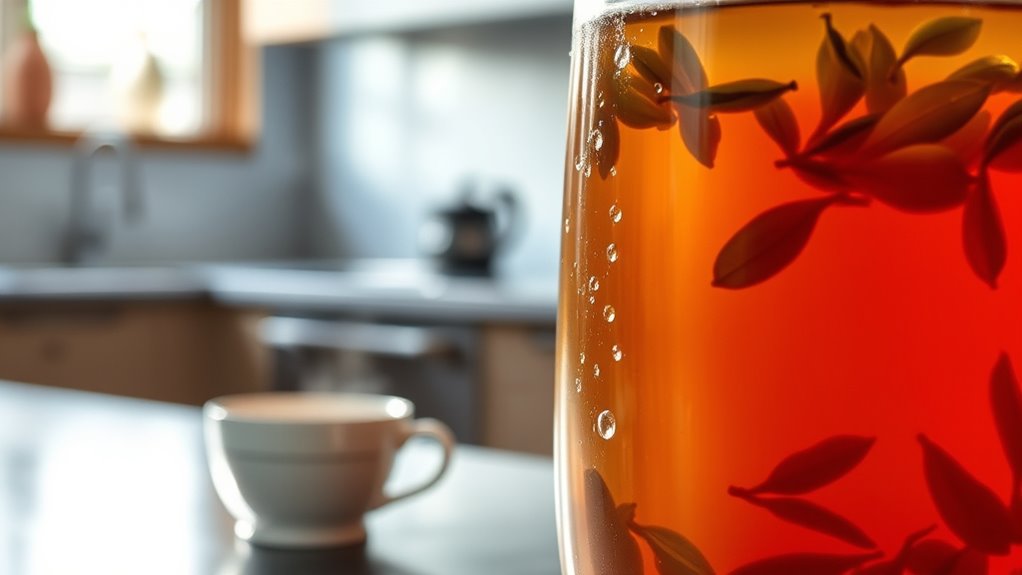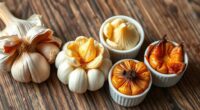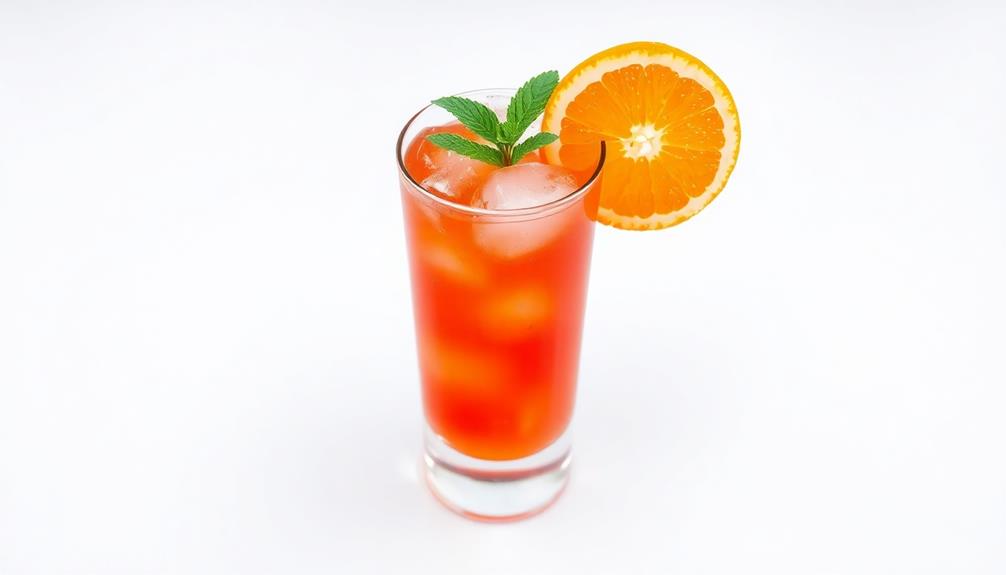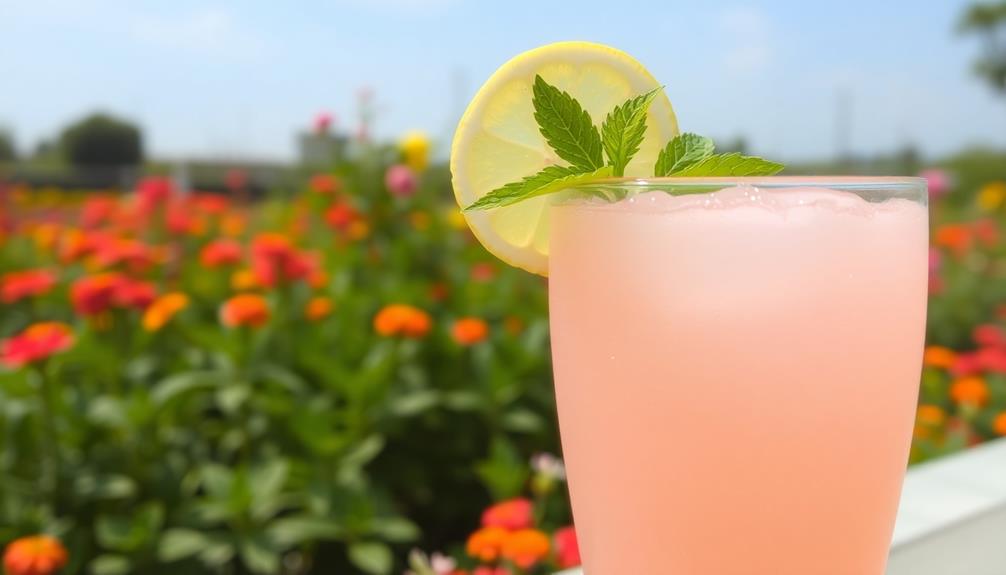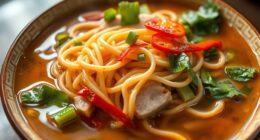To reduce tannins and enjoy a smoother sip, use cold water and steep high-quality tea leaves in the refrigerator for 6 to 12 hours. This slow steeping process minimizes bitterness and emphasizes fruity and floral notes. Adjust the steeping time based on your taste preference, and avoid hot water, which releases tannins quickly. Keep exploring for more tips on fine-tuning your cold-brew technique for the perfect, mellow tea experience.
Key Takeaways
- Use cold, filtered water and steep tea in the refrigerator for 6 to 12 hours to minimize tannin extraction.
- Opt for high-quality loose leaf teas or tea bags with delicate or fruity notes to reduce bitterness.
- Extend steeping time gradually to develop flavor without increasing tannins or bitterness.
- Avoid hot water, as it causes rapid tannin release; cold water ensures gentle extraction.
- Add herbs, citrus, or honey after steeping to enhance flavor without introducing additional tannins.

Cold-brew tea is a simple and invigorating way to enjoy your favorite flavors without the fuss of traditional brewing. When you opt for this method, you control the tea steeping process, which directly influences the flavor extraction and overall taste. Unlike hot brewing, cold steeping allows the tea to develop a smoother, more delicate profile, often with less bitterness and tannins. This is especially appealing if you’re sensitive to the astringency that some teas can have when brewed hot.
The key to reducing tannins and achieving a smoother sip lies in how you approach tea steeping. Because cold water extracts flavors more slowly, it minimizes the release of tannins—these compounds are responsible for that dry, bitter sensation. To start, choose high-quality loose leaf teas or tea bags designed for cold brewing. Submerge the tea in cold, filtered water, and let it steep in the refrigerator. The temperature slows down the extraction process, giving you more control over the flavor profile. Usually, a steeping time of 6 to 12 hours is sufficient, but you can extend it if you prefer a stronger flavor. During this period, you’ll notice the tea gradually releases its aroma and taste, becoming more complex without becoming overly bitter.
As the tea steeps, you might wonder how to optimize flavor extraction while keeping tannins in check. The trick is to avoid hot water, which accelerates tannin release, resulting in a harsher, more astringent brew. Cold-steeping, on the other hand, promotes a gentle extraction of flavors—think fruity, floral, and nuanced notes—without the sharpness of hot-brewed teas. If you want to enhance the smoothness further, consider adding ingredients like herbs, citrus peels, or a touch of honey after steeping. These additions can complement the tea’s natural flavors and create a more balanced, invigorating drink. Additionally, understanding the role of temperature in extraction helps you better control the final taste and tannin levels. Controlling steeping conditions is essential for achieving the ideal balance between flavor and smoothness. Adjusting steeping time accordingly allows for a tailored flavor experience, balancing strength and smoothness.
When your tea has steeped long enough, strain out the leaves or remove the tea bags. You’ll find that the resulting brew is often clearer and less cloudy than hot-brewed versions, with a softer, more refined taste. The reduced tannins contribute to a more enjoyable experience, especially if you plan to drink it over ice or mix it into cocktails. Cold-brew tea techniques give you a versatile, low-maintenance way to craft a smooth, flavorful beverage. By paying attention to tea steeping times and temperature control, you ensure a perfect extraction that highlights the best qualities of your tea while keeping bitterness at bay.
Frequently Asked Questions
Can Cold-Brew Tea Be Prepared With Flavored or Herbal Teas?
Yes, you can prepare cold-brew tea with flavored herbal teas. Cold infusion benefits include a smoother, less bitter taste, which works well with herbal and flavored options. Simply steep your chosen teas in cold water for several hours. This method preserves natural flavors and aromas, making your tea invigorating and vibrant. It’s a great way to enjoy a variety of herbal blends without the bitterness often associated with hot brewing.
How Long Should Cold-Brew Tea Steep for Optimal Tannin Reduction?
Did you know that steeping duration can substantially influence tannin extraction in tea? For a smoother sip, aim for a cold brew steeping duration of about 8 to 12 hours. This allows enough time to reduce tannins without over-extracting bitterness. Keep in mind, longer steeping can increase tannin content, so sticking to this window helps ensure a balanced, mellow flavor every time.
Does Water Temperature Affect the Smoothness of Cold-Brew Tea?
Water temperature definitely affects the smoothness of your cold-brew tea. Using colder water during steeping helps reduce tannins, making your tea gentler and less bitter. While steeping duration is essential, starting with cold water allows a slow extraction, enhancing smoothness. So, keep the water cold, and extend your steeping time if needed, to get a mellow, enjoyable brew with fewer tannins for a better sip.
Are There Specific Tea Varieties Best Suited for Cold Brewing?
You might wonder if some tea varieties excel for cold brewing. Investigating reveals that lighter teas like green, white, and certain oolongs excel because their delicate leaves infuse flavor gently without bitterness. Your tea leaf selection impacts flavor infusion, giving you a more mellow, more enjoyable cold-brew experience. Experimenting with these types ensures you get an invigorating, less tannic sip, perfect for hot days or relaxing moments.
How Does Cold Brewing Impact the Antioxidant Content of Tea?
Cold brewing helps preserve more antioxidants in your tea, unlike hot brewing which can degrade them with heat. By steeping tea slowly in cold water, you retain higher levels of these beneficial compounds, enhancing your health benefits. This process also minimizes tannins, making your tea smoother and less astringent. So, when you cold brew, you get a flavorful, antioxidant-rich drink that’s gentler on your stomach and better for your overall health.
Conclusion
So, next time you want a smoother tea, don’t bother boiling or steeping hot—just embrace the cold brew method. Ironically, the cooler approach not only reduces those pesky tannins but also saves you from the bitterness you didn’t realize you disliked. It’s funny how chilling out can actually make your tea taste better. So, go ahead, stay cool and sip happily—your taste buds will thank you for the irony.
